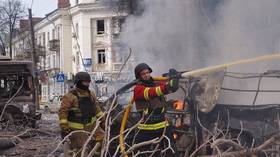‘Building tomorrow’s mask’: US government announces $500k ‘innovation’ challenge for FUTURE needs
As the Biden administration insists on double-masking indefinitely and funding a design for new, better face coverings, Americans yearning to breathe free once the coronavirus pandemic is over may need to think again.
The Department of Health and Human Services (HHS) has just announced a contest for “innovative and effective designs for mass-producible, low-cost-per-use devices to be worn by the general public in order to provide protection from respiratory disease pathogens,” with a total prize pool of $500,000.
“With this mask challenge, we want to get people across the country involved in developing new masks that are both effective and comfortable,” said Nikki Bratcher-Bowman, the acting assistant secretary for preparedness and response. “This will help us control [Covid]-19 and be better prepared for future public health emergencies.”
Also on rt.com Biden calls for states to halt reopenings as Covid-19 cases tick upward nationally, even as some mandate-free states see declinesThe challenge is overseen by the Biomedical Advanced Research and Development Authority (BARDA) in cooperation with the CDC’s National Institute for Occupational Safety and Health (NIOSH). Initial submissions are due by April 21, and up to 10 winning ideas will be selected to split a $100,000 prize pool.
In phase two, participants will submit prototypes that “leverage research” on filtration efficiency and meet other criteria that include “fit, comfort, and how easily the design can be manufactured on large scale.” Up to five winning prototypes will split the remaining $400,000 prize fund and gain access to BARDA’s scientific expertise to complete development – but any submissions become intellectual property of the HHS. The contest is open to US citizens, legal residents and US-owned businesses.
The contest comes as the Biden administration doubled down on the need to wear masks even when vaccinated against Covid-19, and opposed the push of states to emerge from lockdowns citing the ongoing health emergency. According to Dr. Anthony Fauci, President Joe Biden’s chief coronavirus adviser, it might be possible to stop wearing masks sometime in 2022 – unless things change, that is.
Also on rt.com Be a goody two-masks: US health authorities change guidelines to urge DOUBLE masking against Covid-19Last month, the CDC literally doubled down on mask guidelines, urging Americans to wear two coverings to ensure a tighter fit. US health authorities did acknowledge this could result in problems such as difficulty breathing. Announcing the contest, the HHS admitted barriers to mask usage include “contact dermatitis with prolonged wear, physical discomfort, fogging of eyeglasses, and difficulty communicating,” which the new designs are supposed to address.
This is not the first push to develop a better face covering. Last year, the Xprize foundation spent $1 million to fund a contest for a design that would “redefine the norm of mask-wearing behavior.” A team of undergraduates from Baltimore’s Johns Hopkins University won a $250,000 prize for developing a modular mask prototype. It’s unclear what became of it since then.
Congratulations to @TeamPolair on winning $250,000 in @xprize's Next-Gen Mask Challenge. Their prototype is recognized as reflecting "the future of mask technology."https://t.co/GyrtpJAIbD
— Johns Hopkins University (@JohnsHopkins) December 22, 2020
Mask-wearing has been a hotly debated issue since the beginning of the Covid-19 pandemic. While initial guidance from the World Health Organization advised their use by medical personnel rather than general populations, countries around the world have gone on to mandate their widespread use, even outdoors – or in the case of the US, in double layers – insisting they were the most effective measure to mitigate the spread of the virus.
Think your friends would be interested? Share this story!













